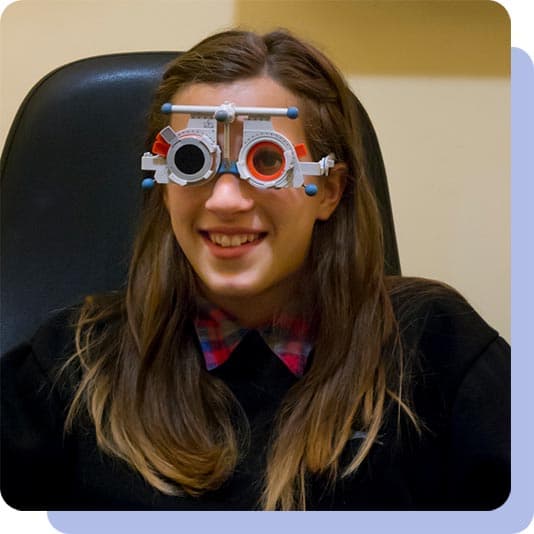How often should I have an eye test?
When and why you should visit the optician
Published on 07/06/21
Updated on 31/03/23
Our eyes are working every waking hour of our lives. They're on the go between every blink. Yet, it's so easy to take them for granted.
We'll binge-watch an entire series at the weekend. Spend long summer days out in the sun. Go swimming or do some gardening or have our head in a book. We want to enjoy and see all these things, which is why it's all about keeping things working and healthy.
That's why we believe in preventive care - getting regular check-ups. That way, you can keep an eye on things, and detect problems early to hopefully avoid what could potentially become more significant issues in the future.
So with all that in mind, when should you go for an eye check-up?

When to visit your opticians
The NHS recommends that adults have their eyes tested every two years. However, if something's changed or you're concerned about your eye health, definitely have one sooner. Always follow the advice of your optometrist if they suggest more frequent eye tests.
It's advisable to have regular eye tests, even if you have no concerns about the health of your eyes. As well as testing your vision, your optician can spot signs of some minor eye conditions, plus some more serious health conditions – before you're even aware of them. A lot of these issues can be treated if they're found in time.
Some of those serious conditions that can be found during an eye test include:
Diabetes
High blood pressure
Cardiovascular disease
Arthritis
Tumours
Glaucoma
Cataracts
Quite an eye-opener that there's a lot more to eye check-ups than just getting a new set of glasses.
Go when you need to
That sounds obvious, but it's advice we'll always recommend. Go for a check-up whenever you feel like there's a change in your eyesight. If reading something close up or far away has become a problem. If the TV doesn't look quite so sharp. And especially if you notice it when driving, like having difficulties reading road signs. Book an appointment for an eye test and get on top of things.
Your first visit
If you've never had an eye test before, it's natural to have a few nerves or not see the value, especially if you're a bit sensitive to things going near your eye. But don't worry, the practitioners are experts in their field and will have your best interests at heart. We've also written about what to expect during an eye check-up which hopefully will settle your mind.
Age plays a role
Your eyes degenerate over time; it's only natural. Even if you have glasses or contact lenses, you should monitor changes to your sight and arrange an eye test if you're concerned.
A change to your vision isn't necessarily a cause for concern. If your eyesight isn't quite so clear anymore, there's no need to panic. But do be sure to visit the opticians as soon as you can.
Driving and your eyes
As part of the DVLA guidelines, we must be able to read a number plate 20 metres away. In every practical driving test, your examiner will start by asking you to read a number plate to verify your vision. If you fail this, you fail the whole exam. And if you're driving a lorry or a bus, the standards will be higher.
Office use
A lot of us spend our working days sitting at a desk and typing away at a computer, whether that’s in an office, at home, or a combination. But after four+ hours of staring at a screen, our eyes can start to feel tired or strained. We might get itching or a dry sensation in the eyes, even headaches and difficulty focusing.
There are ways to self-help at work. You can add to your working routine:
Frequent pauses, looking away from the screen - Take advantage of the 20-20-20 rule. Easy to remember the name, not so easy to remember to do it. For every 20 minutes on a screen, look at something 20 feet away for 20 seconds. Set a reminder to give you a nudge; your eyes will thank you
Follow the advice - The experts know what they're talking about. Wear your glasses or contact lenses for reading screens only when advised to do so by your optometrist.
Blink regularly – not just the usual, half-a-second ones. Take some slow, deliberate blinks. It'll help moisten the eyes, reducing the dry sensation.
Find a good light - Ensure that you're working in a well-lit environment, without light reflecting off the computer screen. You don't want glare, and you don't want to be overstraining.
All this still applies when you log off and head home. When we finish a day using a medium screen, we sit down and watch the big screen while using a small screen. Think of your eyes!
As for check-ups, stick to the same rules - every two years, unless you notice a change or if your optometrist recommends you to be seen more regularly. Mention to your optometrist if you use computers a lot. That knowledge will help them with the test, and they may also suggest additions to your next set of glasses. If you do not wear glasses, you may be provided with some guidance to help you look after your eyes when using computer screens.
It could be worth having a word with your HR or Benefits team at work as well. You might be lucky and have your eye tests provided for free, or at a discounted rate.
How a Simplyhealth Health Plan can help
Simplyhealth Health Plans make it straightforward to claim back towards the costs of your everyday healthcare treatments and include an optical allowance. Our process is easy, join Simplyhealth, book your eye check-up, attend and pay for your appointment and get an itemised receipt. Then claim back the cost of your bill, up to annual limits.
Whatever benefit entitlement you have left over from your eye test cost could be put towards a new pair of glasses, contact lenses, or even sunglasses if they're prescription. Like with any other purchase, you may find it helpful to shop around to compare products and price points to ensure you’re happy with the quality and value for money you’re receiving.
Claim back your optical costs today
Our 1-2-3 Health Plan provides cover that’s ready to use whenever you need it, from £20 a month.
Related articles and guides

Your guide to eye health
Everything you need to know about your trip to the opticians, including what an appointment is like and who the different practitioners are.
Health treatment guides
Learn about other treatments and services that can support your health and wellbeing, like physiotherapy, online GP services, and podiatry.

Three ways to look after your eyes
Discover three simple ways of looking after your eyes in your day-to-day life.
This material may contain links to other websites operated by third parties. It is the responsibility of third parties to ensure such material and websites comply with all relevant laws and regulations. To the maximum extent permissible by law Simplyhealth disclaims all responsibility for such websites.